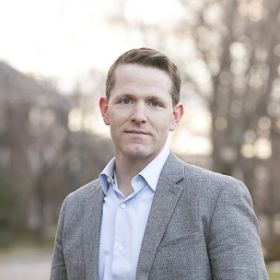Ted Wiley
MBA 2009
MBA 2009
“The power of the HBS brand and network is quite evident, but for me, the value of the instruction was also extremely high. It forms the basis for the frameworks I apply to my day-to-day activities, from finance to leadership to operations.”
“It sparked the realization that this method of providing energy to the world couldn’t go on indefinitely,” he says. “I thought I might want to start a company involved in the clean energy and sustainability space, but at the time I didn’t have any practical business experience.”
He researched MBA programs; Harvard’s appealed to him for its emphasis on leadership and general management skills. Accepted at HBS, Wiley became a member of the Energy & Environment Club and pursued a summer internship at Hudson Clean Energy Partners, a private equity firm. While there, he realized he enjoyed touring a company’s factory and meeting its employees, more than creating financial models to determine whether or not it made sense as an acquisition. “Investing is still interesting to me, but actually being in the company is what got me excited,” he recalls.
Back at HBS, Wiley enrolled in Building Green Businesses, a second-year course that included a student project component with participating companies. Along with two classmates, he worked on a business plan for a “stealth battery startup.” After graduation, the assignment evolved into a cofounder role at what would become Aquion Energy, where over the course of four years he brought the product—a sustainable battery made from saltwater, carbon, cotton, and manganese oxide—to market. “That was an incredible experience,” says Wiley, who along the way met architect William McDonough, a proponent of the “Cradle to Cradle” inspired design philosophy advocating efficient, socially just, waste-free systems of production. (Aquion became the first battery to receive Cradle to Cradle Certification.)
With Aquion launched and stable, Wiley stayed in touch with McDonough. “Bill was incubating a couple of very interesting startups, in addition to helping large companies implement the principles of Cradle to Cradle,” says Wiley. “When he asked me to join McDonough Innovation as president to help with that work, I was extremely excited.” One of the startups, a building materials company, uses recycled and recyclable materials such as aluminum and waste plastics to create structures designed for easy disassembly and reconstruction. “It’s a very low-cost, easy-to-deploy building system that can supply housing for people in need around the world, in addition to reducing the amount of waste being leaked into the environment,” Wiley explains. (A prototype debuted in January 2017 at the World Economic Forum in Davos, Switzerland.)
Looking back, Wiley notes that the Army taught him to lead in challenging but well-defined circumstances, with a detailed mission and rules of engagement. “HBS is the place where I learned how to approach problem-solving in undefined circumstances,” he says. “Every night I had to go through a case, develop a framework to understand the situation, and come up with a plan. The next day I got to sit in a class with 90 people who were all extremely bright and hear their approach. Then we got to hear a world class thinker on the topic—the professor—and sometimes even the case protagonist.
“The power of the HBS brand and network is quite evident, but for me, the value of the instruction was also extremely high,” he continues. “It forms the basis for the frameworks I apply to my day-to-day activities, from finance to leadership to operations.”
Returning to his military background, Wiley notes that his strongest takeaway from his service is that often, what seems impossible, is not. “There’s a tremendous power in perseverance and optimism,” he says. “I saw firsthand the results of committed people attempting and succeeding.” It’s a realization that fits well with this next phase of his career, too.

